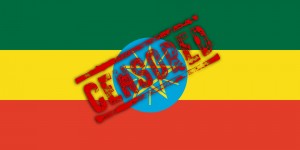Donors Should Condemn Verdicts, Demand Legal Reforms
(Nairobi) – Ethiopian high court on June 27, 2012, convicted 24 journalists, political opposition leaders, and others under Ethiopia’s deeply flawed anti-terrorism law, Human Rights Watch said today.
The Ethiopian government should immediately drop all politically motivated charges against the defendants and amend the law’s most pernicious provisions, which are being used to criminalize free expression and peaceful dissent, Human Rights Watch said.
In the third high-profile “terrorism” verdict in the past six months, Eskinder Nega Fenta, an independent journalist and blogger, was one of six journalists convicted under the Anti-Terrorism Proclamation of 2009. Their sentencing is expected on July 13.
Eskinder Nega, who was recently honored with the prestigious PEN America press freedom award, is in detention in Addis Ababa, and was convicted of conspiracy to commit terrorist acts, which carries a sentence of 15 years to life imprisonment or death,as well as participation in a terrorist organization and treason. The other five journalists were convicted in absentia. A total of 11 journalists have been charged or convicted under the anti-terrorism law since December 2011, including two Swedish journalists who were arrested while trying to investigate the conflict in Ethiopia’s eastern Somali region.
“This case shows that Ethiopia’s government will not tolerate even the mildest criticism,” saidLeslie Lefkow, deputy Africa director at Human Rights Watch. “The use of draconian laws and trumped-up charges to crack down on free speech and peaceful dissent makes a mockery of the rule of law.”
Members of the political opposition were also among those convicted under the law on June 27.
Andualem Arage Wale and Nathnael Mekonnen Gebre Kidan, prominent members of Unity for Democracy and Justice (UDJ), a registered opposition political party, were found guilty of conspiracy to commit terrorist acts as well as participation in a terrorist organization and treason as was Kinfemichael Debebe Bereded, a member of the All Ethiopian Democratic Party (AEDP).
The convictions bring the total known number of individuals convicted of terrorism-related charges to 34, including 11 journalists, at least 4 opposition supporters and 19 others.
The anti-terrorism law’s most problematic provisions were used during this trial, Human Rights Watch said.
Two of the journalists tried in absentia, Mesfin Negash and Abiye Tekle Mariam, were convicted under the law’s article on support for terrorism, which contains a vague prohibition on “moral support.” This provision is contrary to the principle of legality, which requires that people be able to determine what acts would constitute a crime. Only journalists have been charged and convicted under this article.
All of the 24 defendants were initially charged with “terrorist acts.” Human Rights Watch has repeatedly raised concerns over the law’s broad definition of “terrorist acts,” which can be used to prosecute lawful, peaceful dissent. Similarly, all defendants were initially charged with “encouragement of terrorism,” which includes the publication of statements “likely to be understood as encouraging terrorist acts,” a provision that Human Rights Watch has warned could be used against government critics and journalists who even publish the names of organizations or individuals deemed to be terrorists.
“The Ethiopian government is using every means at its disposal to shut down press freedom,” Lefkow said. “Ethiopia’s international partners should immediately call for the release of the many journalists and opposition supporters unlawfully prosecuted, and for the revision of the law that put them behind bars.”
Ethiopian courts have little independence from the government. As in earlier terrorism trials, the trial of the 24 was marred by serious due process violations, Human Rights Watch said. The defendants had no access to legal counsel during almost two months of pre-trial detention and complaints of mistreatment and torture by defendants were not appropriately investigated.
Nathnael Mekonnen told the court that during his pre-trial detention he was tortured for 23 days, including being beaten, forced to stand for hours upon end, deprived of sleep, and having cold water repeatedly poured over him at the notorious Maekelawi facility. His complaints were not investigated. According to credible sources, Andualem Arage lodged a complaint after he was beaten by a convicted prisoner on February 15 in Kaliti prison, but his complaint was dismissed. The court prevented further questioning by defense attorneys and accepted as fact the response by the prison administrator that contradicted Andualem’s claims, without further investigation.
Furthermore, the Ethiopian authorities and government media have repeatedly undermined defendants’ presumption of innocence. In October 2011 Prime Minister Meles Zenawi told the Ethiopian parliament that the journalists and political opposition members arrested under the law were guilty of terrorism.
In late November state-run Ethiopian Television (ETV) broadcast a three-part program called “Akeldama” (“Land of Blood”) in which several of the defendants, including Andualem Arage and Nathnael Mekonnen, were filmed in detention, seemingly under duress, describing their alleged involvement in what the documentary brands a “terrorist plot.” Allegations were also made against Eskinder Nega. The court reportedly dismissed the complaints of due process violations against the defendants on the grounds that the video footage was not produced as evidence by the prosecutor.
The same court later charged the editor of the independent weekly newspaper Feteh, Temesghen Desalegn, of contempt of court for having among other things reproduced verbatim statements made by a defendant. The courts in Ethiopia have little independence from the government.
“The courts trying cases under the anti-terrorism law have repeatedly run roughshod over the rights of defendants,” Lefkow said. “Judicial independence has all but vanished in any politically sensitive case in Ethiopia.”
Report by
Human Rights Watch




 Troubling news is coming out of East Africa this week. International media site
Troubling news is coming out of East Africa this week. International media site